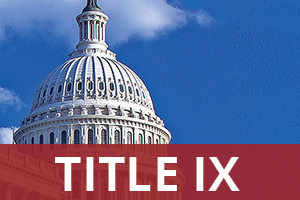by CUPA-HR | August 1, 2024
On August 1, the Biden administration’s Title IX final rule goes into effect, implementing new requirements for compliance with Title IX for institutions of higher education. However, ongoing legal challenges have blocked the rule from taking effect in 26 states, as well as at certain institutions in states that have not sued the Department of Education (ED).
Background
On April 19, ED released the text of the highly anticipated Title IX final rule. The final rule expands protections against sex-based discrimination to cover sexual orientation, gender identity, and pregnancy or related conditions, and it implements new training requirements for employees and grievance procedures for handling reported cases of sex-based discrimination, including sexual harassment. To provide members with an overview of the final rule, CUPA-HR held a webinar in April, which was recorded and can be accessed for free.
Lawsuits
Shortly after the rule was published, over 20 Republican-led states and advocacy groups filed lawsuits challenging the final rule. The lawsuits sought to block ED from implementing and enforcing the final rule, though most of them homed in on concerns with expanding Title IX protections to transgender individuals through the expanded protections against discrimination based on an individual’s gender identity.
From mid-June through the end of July, federal judges across the country granted preliminary injunctions to the states and advocacy groups challenging the rule, meaning the Department of Education is blocked from enforcing the new Title IX rule on the August 1 effective date. All 26 states that sued ED for the Title IX rule were ultimately granted injunctive relief. Additionally, a decision from the U.S. District Court of Kansas expanded the preliminary injunction to include schools attended by members of the Young America’s Foundation, Female Athletes United, and Moms for Liberty. This means that ED cannot enforce the new Title IX rule at certain schools in the 24 states that didn’t challenge the rule, as well as Washington, D.C., and Puerto Rico.
The Biden administration has appealed to the Supreme Court on the decisions granting the preliminary injunctions. In its emergency request, the administration is asking the court to limit the scope of the preliminary injunction to only block provisions related to gender identity. It argued that the lower court’s decisions to grant preliminary injunctions were based on concerns with the expanded protections for transgender students, and it hopes that other provisions like the new grievance procedures and training requirements can go into effect. A decision from the Supreme Court on the emergency request has not yet been issued.
Looking Ahead
Though ED is blocked from enforcing the new Title IX rule in 26 states, litigation continues in the lower courts where decisions have been issued on whether to strike down the rule. If the rule is struck down, the Biden administration is likely to appeal the decision, though it is unknown whether a decision will be released before the election and potential change in administration. CUPA-HR will keep members apprised of additional updates to the legal challenges against the Title IX final rule.

